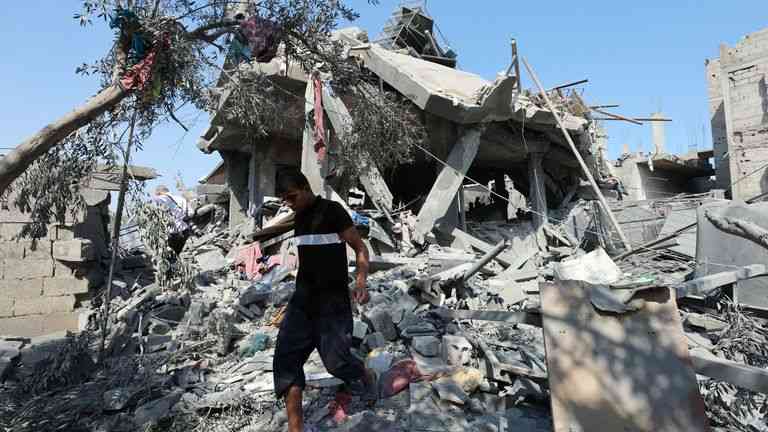
THE International Court of Justice (ICJ) ordered Israel to desist from its Rafah offensive.
South Africa has applauded the ICJ ruling. Israel is pressing on with its offensive regardless.
The rest of the world is also part of this drama; eviscerating the Israeli operation and its entire response to the October 7, 2023 attacks.
It is a drama whose every movement and scene is written in broken bodies, blood and desecrated lives, set to the sombre score of the daily death toll.
Israel’s response is not just sheer bloody-minded obduracy. It is good practical military sense.
Throughout recorded military history, insurgent forces have enjoyed one crucial advantage over the conventional forces they have faced.
It is that insurgencies are invariably an uprising against an established order.
This entails that they have at their core a reasonable grievance or some pretext/cause for war that can be taken to be so.
- Israel vs ICJ: Is this a waste of time?
- The true immorality of Israeli-Hamas war
- SA can no longer afford to ignore Zimbabwe’s accelerated descent
Keep Reading
This cause because it is reasonable assumes some sanctity through its righteousness.
This sanctity, in turn, gives the insurgents much moral currency and a leave to get away with what are grievous human rights violations.
Insurgents generally operate in a morally-permissive and ambiguous context.
This fact poses a challenge for the conventional forces fighting them.
They invariably have the capability to destroy the insurgent forces should the opportunity present itself, but through the guile of the insurgents, finer political and moral considerations, this never happens.
Insurgents do not only manipulate international public opinion, but also morality.
Morality has been, through the hands of insurgent forces, reduced to an amorphous pliable mess.
Atrocities that should ordinarily attract unconditional condemnation are passed as unavoidable evils in the struggle for a cause.
The October 7 attacks fall into this category.
Insurgencies have given the international moral landscape a fluidity and ambiguity that in essence obviates the need for any moral judgement on the conduct of war.
Insurgents are given the leeway to commit crimes simply because of the assumed rightness of their cause.
This puts the State forces fighting against them in political, military and moral quandary: How to respond within the structures of the international rules of war while fighting a foe that not only fights outside of those rules, but also manipulates them to every tactical and political advantage they can.
Israel has refused to fight hobnailed thus.
That is why they have gone into Rafah, that is why they have led in their operations with fire power, dropping 900kg bombs into heavily populated areas.
This is because Israel appreciates more than anyone else that civilian casualties are a cornerstone of Hamas’ political and military strategy.
If Israel is to give due consideration to the unacceptable civilian body count, it would be fighting the war according to Hamas’ playbook.
Every drop of blood shed by a civilian is worth its weight in gold to the Hamas’ war effort, wider political and geo-political calculations.
All the latter has to do is to keep on fighting from among civilians and as the toll mounts, so does international angst against Israel.
The tragedy is that civilian deaths have become Hamas’ only hope of achieving its war aims and salvaging anything from this conflict.
This could quite possibly lure Hamas to do a little more to increase the body count.
It is well within the realms of possibility as shockingly cold-blooded as it might sound to have Hamas decoy Israeli strikes onto civilians.
This is not only possible, but probable.
The biased international public opinion perspective encourages this line of thinking.
A thousand Hamas fighters can die without achieving any sort of military victory on the battlefield, but a thousand civilian deaths are a political victory for Hamas.
The military battle for Hamas becomes, tokenism while its real fight and victories are waged and won by the civilian body count.
In the foregoing scenario, the international community becomes, through its unconditional sympathy for Hamas and condemnation of Israel, complicit.
International public opinion is waiting on each Israeli atrocity.
For Hamas, this is another step towards a victory that could not be achieved by force of arms, but might just be theirs through cold-blooded guile and international duplicity.
The international community as well as public opinion needs to assume that which has been lacking throughout this most unfortunate affair: Balance.
There needs to be a balanced assessment of the conduct of this war, otherwise the killing of civilians will continue.
Israel is compelled to disregard the hysteria around the Palestinian deaths, not to do so would be playing to Hamas’ only real strength.
On the other hand, Hamas needs to continue to feed the Israeli killing machine with innocent lives.
This is their best hope of achieving the international relations coup they set out to achieve with the attacks on October 7.
Hamas cannot achieve a military victory over Israel, it needs to win a political victory that obviates Israeli military might.
Hamas should be just as stridently condemned for each civilian death as Israel.
Only when these deaths cease to be political capital and become a liability for Hamas will some sort of morality return to this war and its conduct.
Hamas provoked this war, Hamas chose the battleground in and among its own people, Israel is just following its lead.
The true immorality of this war might just be the international response, the unconditional support and sympathy for Hamas and its methods.
This is the true driver of the horrendous body count.
- Ignatius Tsuro is a commentator on social and political issues. He writes in his personal capacity.








